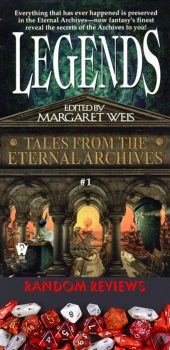Random Review: “The Theft of Destiny” by Josepha Sherman

The other day I was talking about writing with someone who began pointing out the similarity of ideas behind a variety of books. I pointed out that the idea wasn’t always the important thing, what an individual author did with the idea was important. Two authors who come up with the same basic idea would write extremely different stories.
Josepha Sherman’s “The Theft of Destiny,” which first appeared in the Margaret Weis anthology Legends: Tales from the Eternal Archives is certainly not based on a new idea. In fact, Sherman’s story is a retelling of an ancient Mesopotamian myth concerning Enlil, Anzu, and Ninurta. However, Sherman relates the legend in a way that is more resonant with the modern reader.
Over the course of only a few pages, Sherman presents three different viewpoints, beginning with Enlil, who has custody of the Tablets of Destiny. Sherman follows the tablets when they are stolen by Anzu, and, by extension, begins to look at Anzu’s motivations in the theft. Ninurta, Enlil’s son, comes into the picture when his father informs the gods of the theft and his underrated son sees an opportunity to achieve something and make a name for himself.
Without delving too deeply into the mythology behind the two gods, the demon, or the Tablets of Destiny, Sherman works to provide each of them with very realistic and understandable motives for their actions. Anzu doesn’t steal the Tablets merely to set the action of the story in motion and Ninurtu chases after Anzu because he feels the need to demonstrate that he is as capable, or more capable, than the more establish deities.
The story does a good job of presenting its characters in a very limited amount of space. Although Sherman doesn’t delve into Enlil and Ninurtu’s relationship, Ninurtu’s need to prove himself following the theft of the tablets gives the reader the information they need to know. While on the one hand, Anzu is portrayed as a somewhat generic Mesopotamian demon, Sherman pokes into Anzu’s psyche enough to reveal the demon to have a petulance of a child. When told he can’t do something, even if there is a good reason, Anzu has the need to be contrary, leading to the theft of the Tablets.
While the story is complete and Sherman does a good job with the length she has written, the story does feel as if it could be fleshed out a little more without feeling as if it were padded. In keeping with the mythological background that forms the basis for “The Theft of Destiny,” things happen in the story because they happen. Even with the motives that Sherman provides, there is a sense that all of the characters are following a destiny that has been laid out for them by some undesignated force.
 Steven H Silver is a nineteen-time Hugo Award nominee and was the publisher of the Hugo-nominated fanzine Argentus as well as the editor and publisher of ISFiC Press for 8 years. He has also edited books for DAW, NESFA Press, and ZNB. His most recent anthology is Alternate Peace and his novel After Hastings was published in 2020. Steven has chaired the first Midwest Construction, Windycon three times, and the SFWA Nebula Conference 6 times. He was programming chair for Chicon 2000 and Vice Chair of Chicon 7.
Steven H Silver is a nineteen-time Hugo Award nominee and was the publisher of the Hugo-nominated fanzine Argentus as well as the editor and publisher of ISFiC Press for 8 years. He has also edited books for DAW, NESFA Press, and ZNB. His most recent anthology is Alternate Peace and his novel After Hastings was published in 2020. Steven has chaired the first Midwest Construction, Windycon three times, and the SFWA Nebula Conference 6 times. He was programming chair for Chicon 2000 and Vice Chair of Chicon 7.